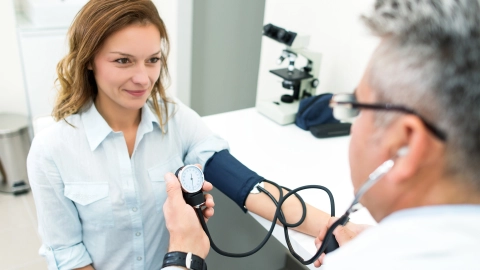Health care Primary care – the role of the family practice
In many cases, the first port of call for any health issues is the family doctor. Family doctors treat many conditions, conduct medical check-ups and have often cared for their patients for many years. If necessary, they can arrange for their patients to access further medical services.
At a glance
- In many cases, the first port of call for any health issues is the family doctor.
- The role of a family doctor, also known as a primary care physician/provider or general practitioner (GP), includes the prevention and early detection of health conditions.
- Family doctors often have a good overview of their patients’ medical histories and lifestyles, having provided them with medical care over many years.
- Family practices can also arrange and coordinate further testing and treatment for their patients.
- In Germany, people are free to choose their own doctor. This means you select which family practice (GP practice, primary care center) to attend as a patient.

What is the role of the family practice?
For many people, their family practice plays a special role in their medical care. Some people visit the same family doctor again and again over many years. Sometimes, the entire family attends the same practice. A trust-based doctor-patient relationship provides an important basis for the best possible medical care. It means that not only the patient’s complete medical history but also social aspects can be considered when diagnosing conditions and making decisions about treatment.
Family doctors conduct medical check-ups and administer vaccinations. They can detect and treat many conditions. If necessary, they prescribe medication or coordinate additional medical care elsewhere – for example, physiotherapy, examinations at specialist medical practices or treatment in hospital. Family doctors can also be helpful in relation to claiming long-term care benefits or accessing the various forms of advice and support that are available.
What services are offered by a family practice?
Family doctors are qualified to answer health-related questions from a wide range of areas. They may have completed advanced specialized training in general medicine or internal medicine. Their broad knowledge of medicine enables them to categorize symptoms, carry out appropriate testing and assess treatment options. When they get to know their patients better, they can also take account of additional aspects of their lives, such as prior illnesses and job- or family-related factors. If necessary, they can visit patients at home or in care facilities.
They work with their patients to make decisions on how to proceed. For example, they determine whether further testing and treatment is possible at the family practice itself or whether the assistance of specialists is required.
In addition to physical examinations, family doctors can, for example, take blood for laboratory testing or perform electrocardiograms (ECGs) and ultrasound scans. Family doctors can prescribe medications as well as therapeutic measures such as physiotherapy or occupational therapy.
Referral and coordination
If necessary, family doctors can refer their patients for treatment by specialist doctors or for treatment in hospital.
Family doctors play the role of coordinator in such cases. They know which types of tests and treatments were administered and are informed about the diagnostic findings from the specialist practices and hospitals to which their patients are referred. They can help patients to understand and process these findings. Their overview also helps their patients find the best way to manage their illness. The same applies to medication, for example – family doctors monitor their effectiveness and potential side-effects and take note of potential interactions between various types of medication.
Another important role of family doctors involves prevention and early detection of diseases. They conduct examinations such as health check-ups and administer vaccinations against infectious diseases.
When should I visit my family doctor?
A family practice is the right point of contact for many medical needs. Reasons for making an appointment to see a family in your family practice include:
- the occurrence of new symptoms
- examinations and treatment of existing illnesses
- the prescription of medication or monitoring of their effects
- medical check-ups and health check-ups
- screening check-ups
- vaccinations
For some illnesses, however, the first point of contact may be a specialist practice – for example, in the cases of problems with hearing or vision. If you are unsure, your family practice will help you identify the right medical expert to address your health concerns.
Important: It is helpful to prepare well for a visit to your doctor and to note down your concerns as well as all important information. This means that you won’t forget anything during your visit.
If you require medical assistance outside of the practice’s opening hours, you can contact the non-emergency medical assistance service by phoning 116117. This will let you know which practice is currently acting as the non-emergency medical assistance service. You can also use the online search for this purpose.
Attending a hospital is necessary if symptoms indicate a life-threatening emergency. Such symptoms include, for example, difficulty breathing, chest pain, severe stomach pain, loss of consciousness or sudden onset of problems with speaking or movement.
How is primary care regulated?
Specialist qualifications and practice type
Doctors who have an advanced qualification in general medicine or internal medicine can work as family doctors within the statutory health insurance system. The Associations of Statutory Health Insurance Physicians (Kassenärztliche Vereinigungen) regulate how many family practices can operate in a district or region.
Any doctors who have completed their medical degree can also operate a private practice. However, statutory health insurance does not cover the costs of treatment in private GP practices.
In addition to individual GP practices, there are also joint practices (clinics), group or shared practice arrangements and medical care centers (MCCs). Here you will find several doctors – often from different areas of medicine – working together. The primary care provided is fundamentally the same as in an individual GP practice. However, you may not always see the same doctor at each visit.
Good to know: As well as advanced medical training, family doctors may also have other specialized qualifications. They may, for example, have expertise in sports medicine, pain therapy or psychology.
Family doctor-centered care
Statutory health insurance funds are required to offer their members an arrangement known as the family doctor program (Hausarzttarif). Patients are free to choose whether to avail of this. With this program, patients agree to always attend one specific family practice. This practice then takes on the role of a gatekeeper for their patient’s health. If the patient requires care at a specialist medical practice, they must generally be referred there by their family doctor. The exceptions to this rule are medical emergencies, as well as visits to practices specializing in pediatric and adolescent medicine, ophthalmology and gynecology.
The family doctor-centered care model is designed to ensure high-quality, well-coordinated medical care while avoiding unnecessary repeat examinations. Once a patient has decided on a family practice, they will receive a bonus payment or co-payment reduction, depending on their statutory health insurance fund.
How can I find a suitable family practice?
In Germany, people are free to choose their own doctor. In other words, patients themselves can select which family practice to attend and can also change practices. They can also choose which family doctor to see.
Various factors can play a role in the selection of a family practice:
- location and accessibility
- consulting hours offered and organization of the practice
- language(s) spoken by the doctors
- services and additional qualifications
- how the practice is rated by other patients
- the relationships between the doctors and their patients
Many people want the practice to be located close to where they live and to be easily accessible. Another crucial factor in choosing a family practice may be accessibility or the option of video appointments.
Additional considerations when choosing a family doctor include consulting hours offers, appointment scheduling options and waiting times in the practice. Knowledge of foreign languages can be critical to successful communication in the practice.
Some family doctors have special qualifications or offer special services. It may also be useful to talk to people you know about their experiences in the practice.
For many people, visiting a doctor and opening up about their health concerns is a very personal matter. This makes it all the more important to feel that you are in safe hands with your doctor. A trust-based relationship can have a positive effect on treatment. If you have an opportunity for an in-depth initial consultation with your doctor, you should make the most of it.
You can use our doctor search to find family practices located near you. You can filter the results by services offered, accessibility or knowledge of foreign languages.
It is also possible to arrange appointments with the appointment service centers operated by the Associations of Statutory Health Insurance Physicians (Kassenärztliche Vereinigungen). These can be contacted by calling 116 117 or via the online e-appointment service.
The State Chambers of Physicians (Ärztekammern der Bundesländer) also offer various doctor search services. Some states have online services, while others provide information over the phone. For details of the doctors search services available in each federal state, see the website of the German Medical Association (Bundesärztekammer).
- Bundesärztekammer. Die Rolle des Hausarztes in der gesundheitlichen Bevölkerung. Aufgerufen am 30.11.23.
- Hausärzteverband Baden-Württemberg. Berufsbild Hausarzt. Aufgerufen am 30.11.23.
- Bayerischer Hausärzteverband. Schritte in die Niederlassung. Aufgerufen am 30.11.23.
- Ärztekammer Niedersachsen. Die Niederlassung als Privatarzt. Aufgerufen am 30.11.23.
- Doctolib. Assistenzarzt – Gehalt, Ausbildung, Dauer. Aufgerufen am 30.11.23.
- Öffentliches Gesundheitsportal Österreichs. Die Suche nach dem Arzt. Aufgerufen am 30.11.23.
- AOK. Gründe für die Notaufnahme: wie Sie einen Notfall erkennen. Aufgerufen am 30.11.23.
- Gesundheitsinformation.de. Gesundheitsversorgung in Deutschland. Aufgerufen am 30.11.23.
- Bundesministerium für Gesundheit. Freie Arztwahl. Aufgerufen am 30.11.23.
- Vereinte Ärzteberatung. Kassenzulassung. Aufgerufen am 07.12.23.
Reviewed by the German Association of General Practitioners (Hausärztinnen- und Hausärzteverband e.V.).
As at:





